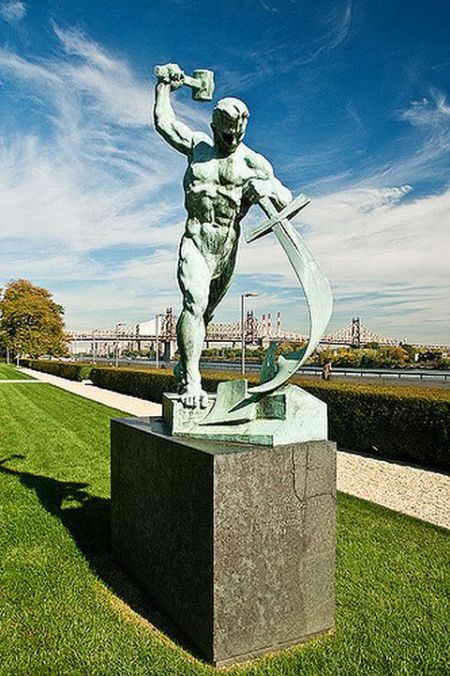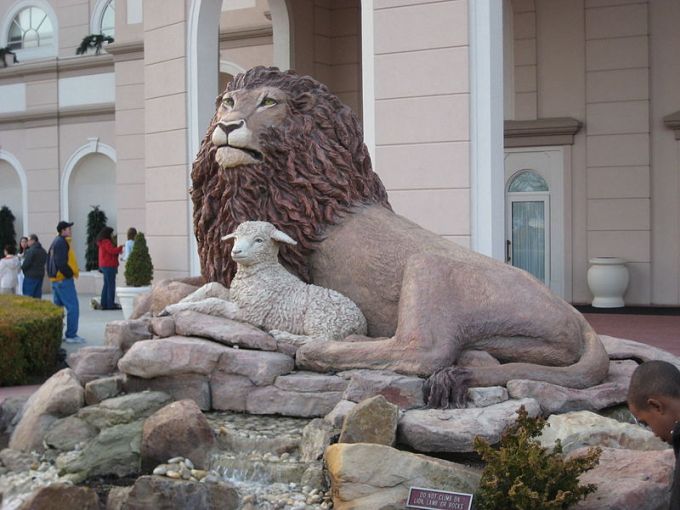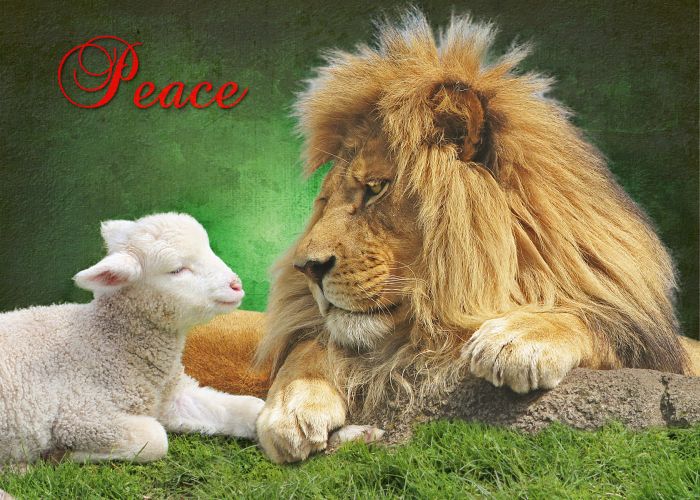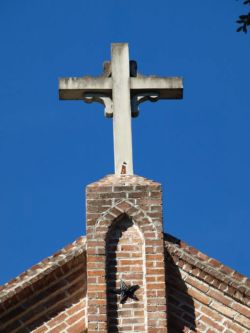Home
Chapter 3
Oracles of Hope In the previous chapter, we dealt with oracles
of doom in the book of Isaiah. Isaiah has some terrifying messages
of doom. But, in general, Isaiah is a very hopeful prophet, who sees
a bright future for God's people. The book of Isaiah is filled
with oracles of hope. For example, at the beginning of chapter 40,
there is a short one: Comfort, comfort my people, says your God. In the coming chapters, we will explore many
oracles of hope in the book of Isaiah. In this chapter we will look
primarily at two. We will be considering a few verses near the
beginning of chapter two of Isaiah, and also at the first part of
chapter eleven, concentrating on verses six through nine. From
chapter two: It shall come to pass in the latter
days And, from Isaiah chapter eleven:
First, the prophecy in Isaiah chapter
two: This passage is almost identical to the
first three verses of Micah chapter four. The interpretation of this
passage is more problematic than some of Isaiah's prophecies.
Many of Isaiah's prophecies are cited in the New Testament, and
therefore at least some information about their interpretation can be
gained from there. This prophecy is not quoted in the New Testament,
which is somewhat surprising since it occupies a prominent place in
the book of Isaiah. There are a few things, though, that can help in
determining the interpretation. One thing that is helpful is to look at
the other prophecies in the book of Isaiah and notice a pattern in
them. They tend to deal, at least in part, with the prophet's own
day and time. This is characteristic of most Old Testament prophets
as well. Contrary to the overly dramatic claims of some people
today, the Old Testament prophets don't typically deal with
modern-day Russia, or China, or Iran. However, Isaiah does have a
recurring wonderful peculiarity about his prophecies, in that,
regardless of where they start, they will usually end up looking
forward to the more distant future: to the time of the Messiah
and the coming of God's kingdom in a special way, or even to
the kingdom's crowning perfection in heaven after time is no more. So a
typical prophecy in Isaiah would look both to the present and to the
future. A second thing that is helpful is that,
although the passage in chapter two is not quoted in the New
Testament, there is one passage that perhaps refers to it. In Luke
24:44-47, we read, Then he said to them, "These are my words that I spoke to you
while I was still with you, that everything written about me in the
Law of Moses and the Prophets and the Psalms must be fulfilled." Then
he opened their minds to understand the Scriptures, and said to them,
"Thus it is written, that the Christ should suffer and on the third
day rise from the dead, and that repentance for the forgiveness of
sins should be proclaimed in his name to all nations, beginning from Jerusalem."
In these verses, Jesus is referring to certain teachings in the Old Testament
that were not as obvious nor as plainly understood before their fulfillment as
other prophetic messages were. Some Messianic prophecies were very obvious, and
the Jewish people were waiting for a Messiah to come in fulfillment of those prophecies.
But some prophecies were not so obvious at the time. They might be in the form of types
and antitypes, wherein the type was a merely a dim shadow of the substance or
fulfillment that would come later in the antitype (such as the three days of Jonah in the
belly of the great fish paralled with the three days that
Jesus would spend in the belly of the earth). Or a prophecy
might be extremely obvious after the fact, but mysterious beforehand (such as the
prophecy of the suffering servant in Isaiah 53 that had confused the Ethiopian eunuch
until he learned about Jesus). The passage in Luke 24, where Jesus is referencing repentance
and forgiveness of sins being preached to all nations "beginning from Jerusalem", has, as
its most likely Old Testament reference, this passage in Isaiah chapter two, which says,
For out of Zion shall go forth the
law, If this is the Scripture that Jesus is referring to, then this passage has Messianic
implications. Third, there is a certain similarity in
thought between the prophecy in chapter two and the prophecy in
chapter eleven, particularly in verses six through nine of chapter eleven. Both have
elements that speak very dramatically of an unusual and wondrous time
of peace. Chapter two verse four talks about beating swords into
plowshares and spears into pruning hooks. Chapter eleven talks about
the wolf dwelling with the lamb, and the lion eating straw and living
with the fatted calves, and a little child safely playing over the
viper's nest. Although the prophecy in chapter two isn't
quoted in the New Testament, verse ten of chapter eleven is quoted
(by Paul) in the New Testament in Romans 15:12 and applied to the
inclusion of the Gentiles into God's kingdom at the time of
Christ. If the prophecies in chapters two and eleven are related,
and the prophecy in chapter eleven has Messianic implications, then
it is likely that the prophecy in chapter two also has Messianic
implications. Fourth, the passage itself is helpful
in its interpretation. In the Old Testament, the phrase "the latter days"
in many cases appears to have a reference to the Messianic Age (e.g., Hosea 3:5). Also, the figurative
language (e.g., "...the mountain of the house of the LORD
shall be established as the highest of the mountains, and shall be
raised above the hills...")
is also characteristically used among Old Testament prophets to
refer to spiritual events rather than to just physical ones. This doesn't mean that the
passage has no application to Isaiah's day. It is rare that an
Old Testament prophet ignores the people and circumstances of his day
when prophesying. Isaiah's characteristic habit of referring both to
his day and to a more distant future in many of his prophecies
would also lend credence to the idea that this prophecy has at least
some application to Isaiah's day as well. It would seem, though, from an initial
reading that an application to the time of Christ would be the
primary emphasis in this prophecy, and that is almost certainly the
case. But there can be comfort also for the people of Isaiah's
day in a secondary fulfillment in an earlier period. When Isaiah speaks to the problems of
his day, sometimes he speaks of a very speedy and almost immediate
resolution. For example, with regard to a raging war between Syria,
Israel, and Judah from 734 to 732 B.C., sometimes referred to as the
Syro-Ephraemitic War, Isaiah comforts the people of Judah by
prophesying in chapter seven that the leaders of those two enemy
nations--Syria and Israel--would very soon be defeated and no
longer be a threat to Judah. He prophesied it; it happened, and
quickly. But many of Isaiah's prophecies look farther
forward--more than 150 years forward--to a return from
Babylonian captivity, and there are possible echoes of that return and its consequences in
this prophecy in chapter two as well. In this scenario, the mountain of the
house of the Lord being exalted as the highest of the mountains (v.2)
fits in well with the resulting history. Out of the original
twelve tribes, ten are removed from political existence by the
Assyrian army. The eleventh, Benjamin, is so minor that it is
basically absorbed and assimilated by the tribe of Judah, and the
nation would be known simply as Judah. Thus, Judah, the site of Mount Zion ("the
mountain of the house of the Lord") would be exalted above all the other
tribes. Many peoples would come to it because they are returning
from captivity and from banishment to distant lands after the
Babylonian captivity ends. In speaking of that time, Isaiah
prophesies elsewhere:
And in that day a great trumpet will be
blown, and those who were lost in the land of Assyria and those who
were driven out to the land of Egypt will come and worship the LORD
on the holy mountain at Jerusalem. The people being
eager to have God teach them his ways (v.3) can be seen in the
instituting of synagogue worship at the time of the Babylonian
captivity. And the peace in the land (v.4) can be seen in the
extended peace following the defeat of the Babylonians and the
successful peace instituted by the Persian Empire. But the application obviously isn't
primarily to Isaiah's day, but to a later time--to the
"latter days"--to a time in which God will exercise a wonderful
rule over his people in a special way. It shall come to pass in the latter
days In the movie Field of Dreams, there is
a famous line that is attributed to the movie that says, "If
you build it, they will come." However, that line is never actually
found in the movie. The correct line that is found several times in
the movie is, "If you build it, he will come.", referring
to the father of Ray Kinsella, the Iowa farmer who built the baseball
field. But three times in the movie the line, "people will
come" is found. That phrase accurately describes the growth of
the church. In Matthew 16:18, Jesus said that he will build his
church. If he builds it, people will come--from all nations and
all peoples. Jesus started with twelve disciples.
Today, those who claim to be adherents of some form of Christian
religion--right or wrong however they may be--number over two
billion people. Indeed the influence that Jesus has exerted on our
world can be seen, at least in part, in that almost one out of every three
people on Earth claim to be an adherent of some form of Christianity. "...all the nations shall
flow to it," Isaiah spoke elsewhere also of a time
when God's flock would not just be the Jews, but all people
from all nations: Arise, shine, for your light has
come, For I know their works and their
thoughts, and I am coming to gather all nations and tongues; and they
shall come and shall see my glory, and I will set a sign among them.
And from them I will send survivors to the nations, to Tarshish, Put,
and Lud, who draw the bow, to Tubal and Javan, to the coastlands
afar off, that have not heard my fame or seen my glory; and they
shall declare my glory among the nations. Isaiah speaks essentially about a
different type of kingdom than that which the people of the world had
known up to this point. He speaks of a kingdom without political
boundaries--a kingdom that would be universal. We see this
fulfilled in the plans and accomplishments of the New Testament
period in the first century and beyond. Go therefore
and make disciples of all nations... And he said to them, "Go into
all the world and preach the gospel to the whole creation. Immediately before his ascension back
into heaven, Jesus told his disciples: "But you will receive power when the Holy Spirit
comes upon you, and you will be My witnesses in Jerusalem,
and in all Judea and Samaria, and to the ends of the earth." At the occasion of that first gospel
sermon, on the day of Pentecost, many had made pilgrimage for the day
of Pentecost from far and wide: Now there were dwelling in Jerusalem
Jews, devout men from every nation under heaven. That message of hope and salvation and redemption would be preached to and find a home with all nations and peoples--to an innumerable throng:
...the hope of the gospel that you heard, which has been proclaimed in all creation under heaven... After this I looked, and behold, a great multitude that no one could number, from every nation,
from all tribes and peoples and languages, standing before the throne and before the Lamb, clothed in
white robes, with palm branches in their hands, and crying out with a loud voice, "Salvation belongs
to our God who sits on the throne, and to the Lamb!" Continuing with the oracle of hope in
Isaiah, chapter two, we come to a fairly well-known passage of peace: ...and they shall beat their
swords into plowshares, This prophecy from Isaiah has found its
way into modern culture. In the United Nations Art Collection in New
York City is a statue (by Evgeniy Vuchetich) entitled "Let Us
Beat Swords into Plowshares". Although
physical peace among the nations can be a byproduct of righteous
behavior, it is peace in a different setting that is the primary
focus of this passage. There will be a transcendent peace between
members of God's kingdom, regardless of their history and background,
that surpasses anything that this world has to offer. And it is
reflected in part in the passage in Isaiah chapter eleven: The wolf shall dwell with the
lamb, This part of Isaiah is sometimes called
"The Peaceable Kingdom" and has inspired the creation of
many paintings, books, poems, songs, short stories, and films.
Speak tenderly to
Jerusalem,
and cry to her
that her warfare is ended,
that
her iniquity is pardoned,
that she has received from the LORD's
hand
double for all her sins.
(Isaiah 40:1-2)
that the mountain of the house of the LORD
shall be
established as the highest of the mountains,
and shall be raised
above the hills;
and all the nations shall flow to it,
and many
peoples shall come, and say:
"Come, let us go up to the
mountain of the LORD,
to the house of the God of Jacob;
that he
may teach us his ways
and that we may walk in his paths."
For
out of Zion shall go forth the law,
and the word of the LORD from
Jerusalem.
He shall judge between the nations,
and shall decide
for many peoples;
and they shall beat their swords into
plowshares,
and their spears into pruning hooks;
nation shall
not lift up sword against nation,
neither shall they learn war any
more.
(Isaiah 2:2-4 [RSV])
and a branch shall grow out of his
roots.
And the Spirit of the LORD shall rest upon him,
the
spirit of wisdom and understanding,
the spirit of counsel and
might,
the spirit of knowledge and the fear of the LORD.
And
his delight shall be in the fear of the LORD.
or decide by what his ears hear;
but with
righteousness he shall judge the poor,
and decide with equity for
the meek of the earth;
and he shall smite the earth with the rod
of his mouth,
and with the breath of his lips he shall slay the
wicked.
Righteousness shall be the girdle of his waist,
and
faithfulness the girdle of his loins.
and the leopard shall lie down with the kid,
and the
calf and the lion and the fatling together,
and a little child
shall lead them.
The cow and the bear shall feed;
their young
shall lie down together;
and the lion shall eat straw like the ox.
The sucking child shall play over
the hole of the asp,
and the weaned child shall put his hand on
the adder's den.
They shall not hurt or destroy
in all my holy
mountain;
for the earth shall be full of the knowledge of the
LORD
as the waters cover the sea.
(Isaiah 11:1-10 [RSV])
(Luke 24:44-47)
and the word of the LORD from Jerusalem.
He shall judge
between the nations,
and shall decide for many peoples;
(Isaiah 2:3b-4a [RSV])
(Isaiah 27:13)
that the mountain of the house of the LORD
shall be
established as the highest of the mountains,
and shall be raised
above the hills;
and all the nations shall flow to it,
and many
peoples shall come, and say:
"Come, let us go up to the
mountain of the LORD,
to the house of the God of Jacob;
that he
may teach us his ways
and that we may walk in his paths."
For
out of Zion shall go forth the law,
and the word of the LORD from
Jerusalem.
He shall judge between the nations,
and shall decide
for many peoples;
and they shall beat their swords into
plowshares,
and their spears into pruning hooks;
nation shall
not lift up sword against nation,
neither shall they learn war any
more.
(Isaiah 2:2-4 [RSV])
to minister to Him,
to love the name of the LORD,
and to be His servants--
all who keep the Sabbath without profaning it
and who hold fast to My covenant--
I will bring them to My holy mountain
and make them joyful in My house of prayer.
Their burnt offerings and sacrifices
will be accepted on My altar,
for My house will be called a house of prayer
for all the nations."
who gathers the dispersed of Israel:
besides those already gathered."
(Isaiah 56:6-8 [BSB])
and the glory of the LORD has risen upon you.
For behold,
darkness shall cover the earth,
and thick darkness the
peoples;
but the LORD will arise upon you,
and his glory will
be seen upon you.
And nations shall come to your light,
and
kings to the brightness of your rising.
(Isaiah 60:1-3)
(Isaiah 66:18-19 [RSV])
(Matthew 28:19a)
(Mark 16:15 [RSV])
(Acts 1:8 [BSB])
(Acts 2:5)
(Colossians 1:23b)
(Revelation 7:9-10)
and their spears into pruning
hooks;
nation shall not lift up sword against nation,
neither
shall they learn war any more.
(Isaiah 2:4b [RSV])

"Let Us Beat Swords
into Plowshares"
by Evgeniy Vuchetich
(Credit: Rian Castillo; BY 2.0 Creative Commons License)
The phrase is also used to
describe the conversion of military discoveries or weaponry into
beneficial peaceful purposes. Some items that had their origin, at
least in principal, in military applications include microwave ovens,
super glue, computers, ultrasound, GPS, Kleenex, the internet, Silly Putty, and WD-40.
and the leopard shall lie down with the kid,
and the calf
and the lion and the fatling together,
and a little child shall
lead them.
The cow and the bear shall feed;
their young shall
lie down together;
and the lion shall eat straw like the ox.
The sucking child shall play over
the hole of the asp,
and the weaned child shall put his hand on
the adder's den.
They shall not hurt or destroy
in all my holy
mountain;
for the earth shall be full of the knowledge of the
LORD
as the waters cover the sea.
(Isaiah 11:6-9 [RSV])
by Edward Hicks
(ca. 1833)

Sight and Sound Theatre
(Lancaster, Pennsylvania)
(Credit: Timothy Shields; BY 3.0 Creative Commons License)

(Credit: Liz West; BY 2.0 Creative Commons License)
One question is whether it is meant to be literal or figurative? Well, probably figurative. The animal imagery suggests this ("the lion shall eat straw like the ox"), and previous verses do as well ("he shall smite the earth with the rod of his mouth").
Many have seen this as a time of a literal return to a time such as at the Garden of Eden. But almost certainly that is not what is intended here. As mentioned earlier, the Apostle Paul quotes verse ten as being fulfilled in Christ, referring to the inclusion of the Gentiles in the church and the hope that the Gentile nations would have through the gospel. He is referring to a time when Christ would rule over his people in the church. The prophecy doesn't look backward to Eden but forward to a time when the Prince of Peace will rule over his kingdom. It looks forward to the church, and ultimately to the church being transformed into the heavenly kingdom. The symbolic language, as elsewhere in Isaiah, isn't to be taken literally, but is used to describe spiritual events. It isn't speaking of a time when lions will literally eat straw. It is referring to a time when enemies will no longer be enemies but will be at peace with each other.
The gospel has the power to change the fierce into the kindly, the wicked into the innocent--just as Saul, the persecutor of the church who sought to kill Christians, was changed into the apostle Paul who sought their redemption.
Then they cast him (i.e., Stephen) out of the city and stoned him; and the witnesses laid down their garments at the feet of a young man named Saul....And Saul was consenting to his death....(Acts 7:58; 8:1a,2-3 [RSV])
But Saul, still breathing threats
and murder against the disciples of the Lord, went to the high priest
and asked him for letters to the synagogues at Damascus, so that if
he found any belonging to the Way, men or women, he might bring them
bound to Jerusalem.
(Acts 9:1-2)
But this enemy of the church and murderer of Christians was changed by the gospel. To the Christians at Thessalonica, Paul wrote:
So deeply do we care for you that we are determined to share
with you not only the gospel of God but also our own selves, because
you have become very dear to us.
(I Thessalonians 2:8 [NRSV])
The man who had once dedicated his life to capturing and killing Christians later said to the Christians at Corinth:
I will most gladly spend and be
spent for your souls.
(II Corinthians 12:15a [WEB])
To those at Philippi, he said:
Even if I am to be poured out as a drink offering upon the
sacrificial offering of your faith, I am glad and rejoice with you
all.
(Philippians 2:17)
These aren't just words. His life was poured out on behalf of those whom he had previously despised and persecuted.
In the book of Romans, in speaking about the Jewish people, he writes:
I am speaking the truth in Christ--I am not lying; my conscience
bears me witness in the Holy Spirit--that I have great sorrow and
unceasing anguish in my heart. For I could wish that I myself were
accursed and cut off from Christ for the sake of my brothers, my kinsmen
according to the flesh.
(Romans 9:1-3)
What Paul is apparently saying here is that, if it were possible, he would be willing to spend an eternity in Hell if it would result in the salvation of his people.
Some people say that everything that we do is prompted by self-interest--that there is no such thing as altruism, or disinterested benevolence--that all of our actions are motivated by what we personally will get out of it. Well, it doesn't seem that self-interest is what rules Paul's decision here. He is compelled rather by his interest for others. He would later write,
Do nothing from selfishness or
conceit, but in humility count others better than yourselves. Let
each of you look not only to his own interests, but also to the
interests of others.
(Philippians 2:3-4 [RSV])
His life was changed by the gospel.
Another example of the power of the gospel to change lives can be seen in the time of Christ. Among his twelve Apostles were Matthew the tax collector and Simon the Zealot. Matthew was a tax collector for the Roman government. He represented a faction that cooperated with and facilitated Roman domination of the Jewish people. Simon the Zealot represented a faction that advocated killing those who cooperated with the Romans. And yet we have these two seemingly natural enemies brought together as apostles of the Prince of Peace--in communion with each other, breaking bread with each other at the first Communion service long ago, working with each other to spread a message of a redemption provided by God.
We see in this an example of what Christ can do. It is perhaps in this light that the prophet Isaiah spoke of a time when
The
wolf shall dwell with the lamb, and the leopard shall lie down with
the kid, and the calf and the lion and the fatling together...
(Isaiah 11:6 [RSV])
Perhaps this is also what is indicated in chapter two where Isaiah says,
...and
they shall beat their swords into plowshares, and their spears into
pruning hooks; nation shall not lift up sword against nation, neither
shall they learn war any more.
(Isaiah 2:4 [RSV])
Paul says that in Christ:
There is neither Jew nor
Greek, there is neither slave nor free, there is neither male nor
female; for you are all one in Christ Jesus.
(Galatians 3:28 [NHEB])
In the book of Colossians, Paul says, referring to life in Christ and Christ in us:
Here there is no Greek or Jew, circumcised or uncircumcised, barbarian, Scythian,
slave, or free, but Christ is all and is in all.
(Colossians 3:11
[BSB])
In the church, whether we are American or Iranian, British or Albanian, Russian or Nigerian, we are not just friends. We are family.
There is a poem of sorts
that I like by Bob Benson. It is called "Just Wood".
|
"Just Wood" Isn't it
strange that we should glorify the cross,
|
|
|
|


